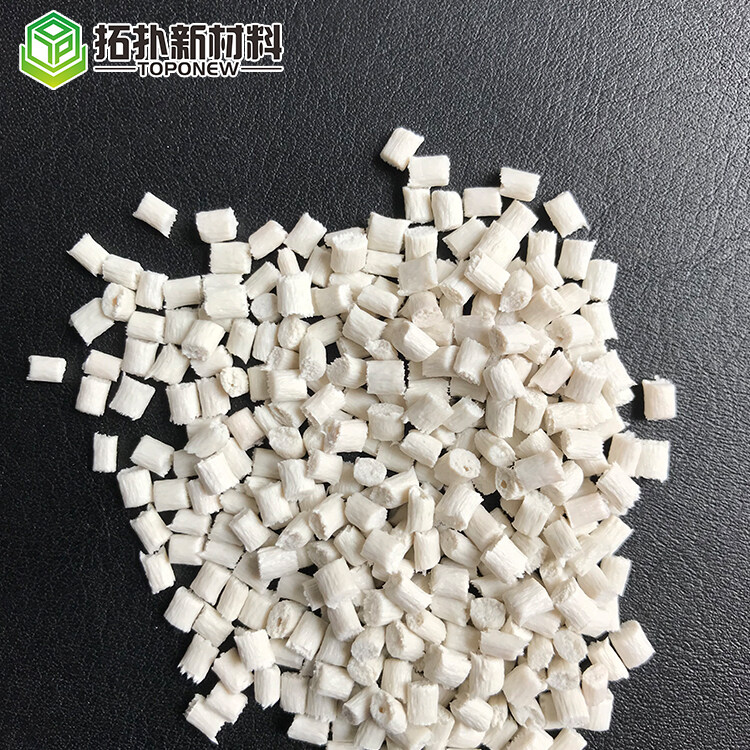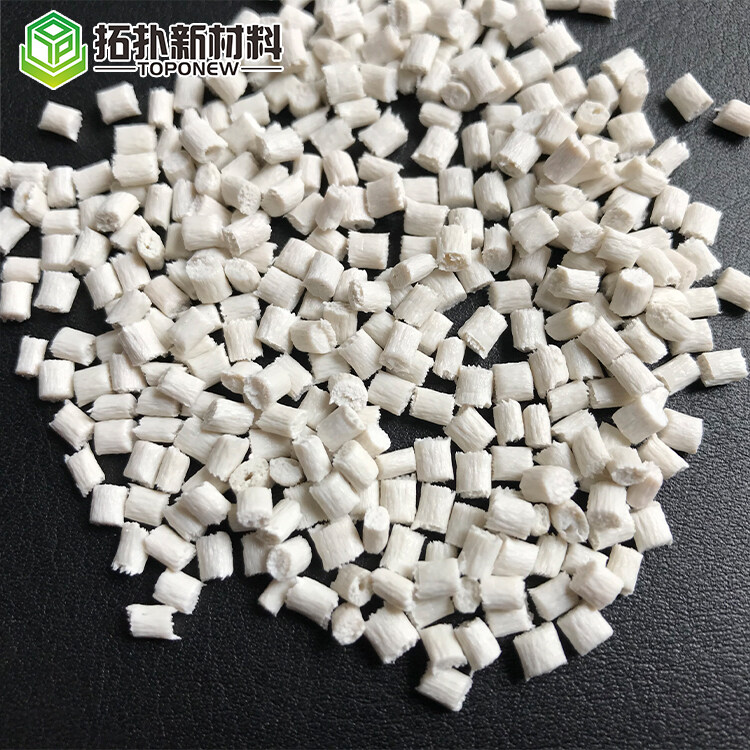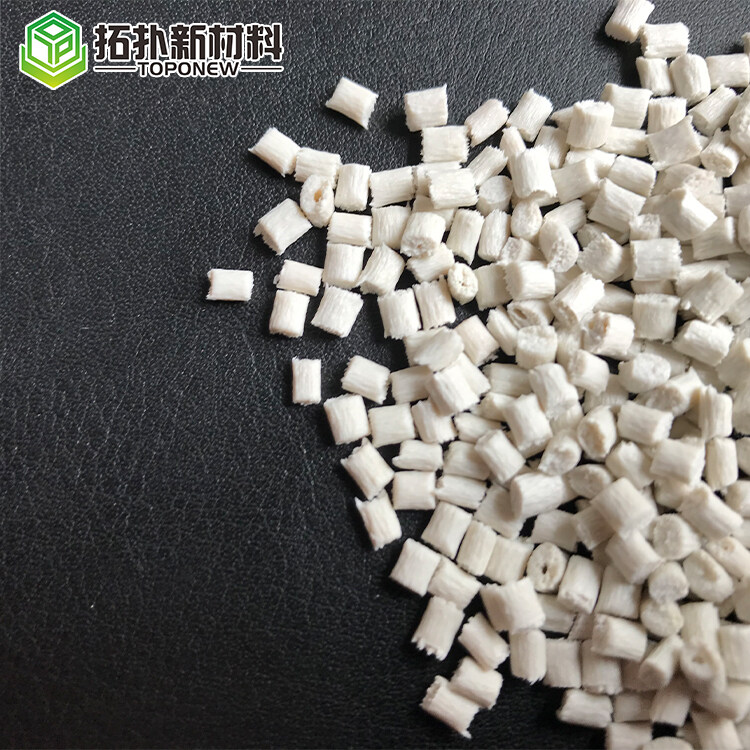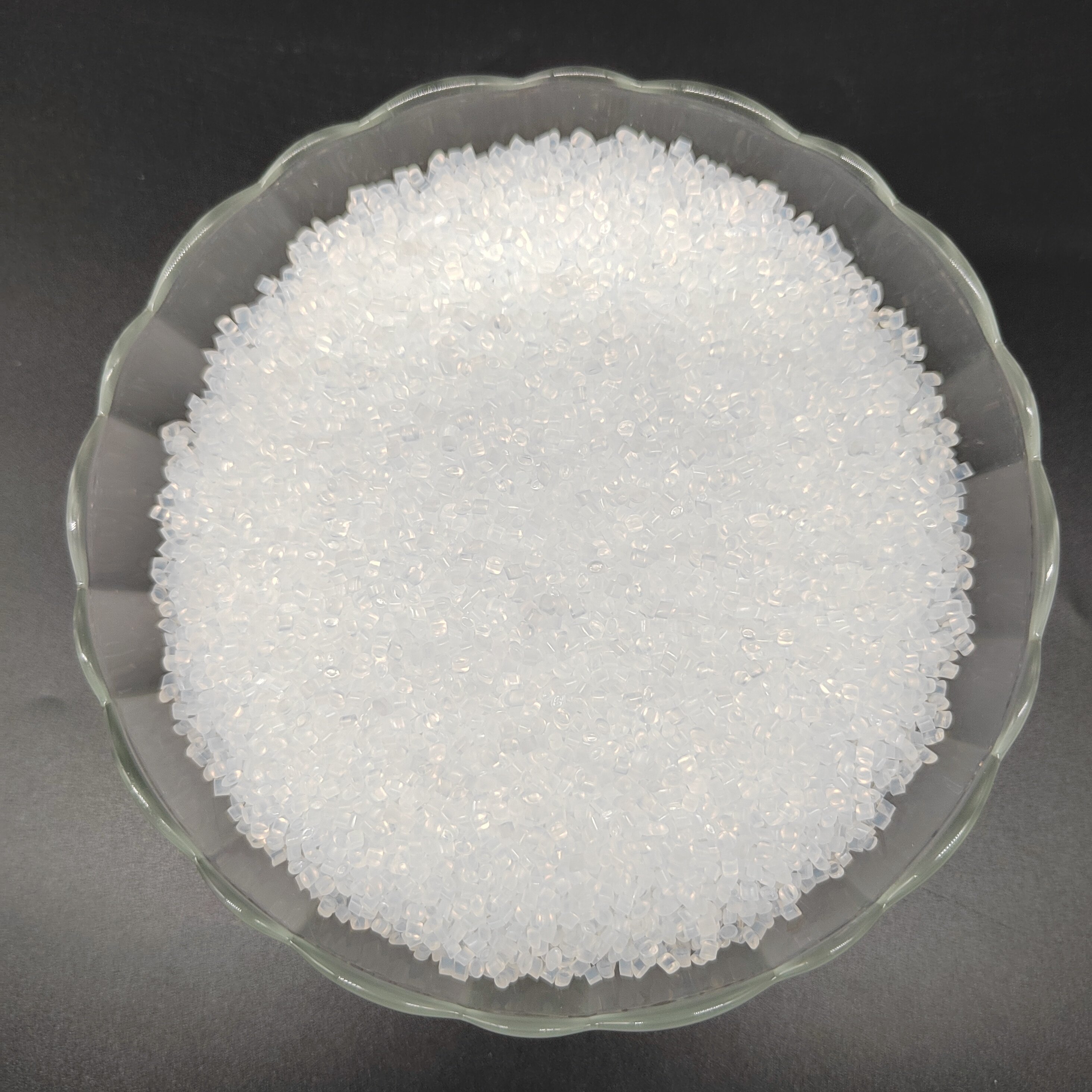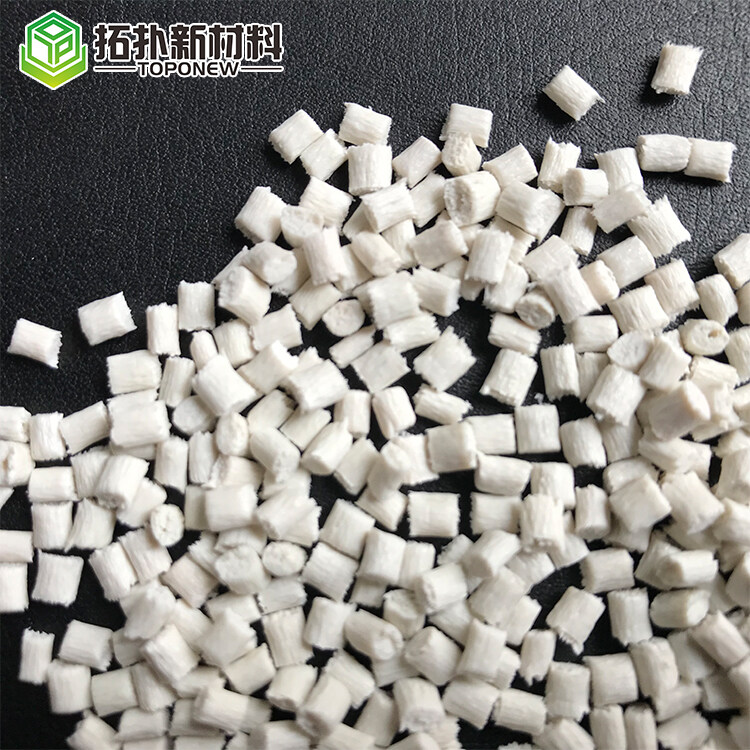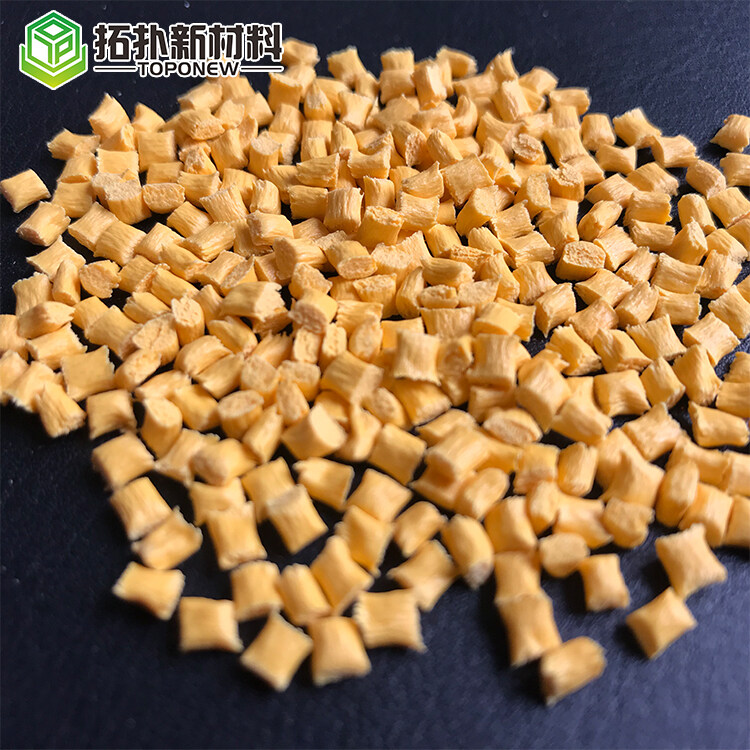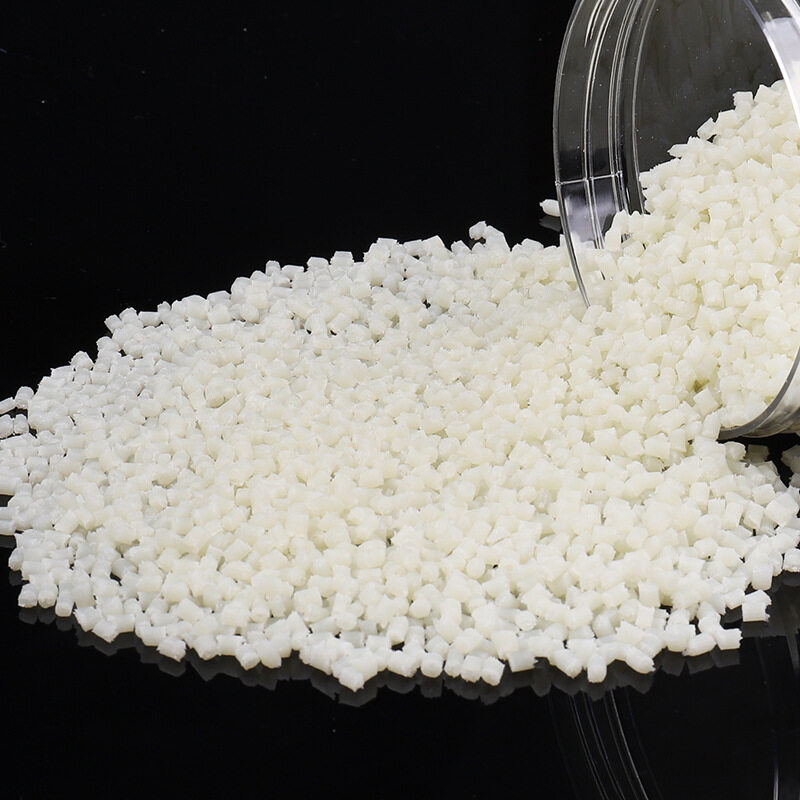Email format error
Email cannot be empty
Email already exists
6-20 characters(letters plus numbers only)
The password is inconsistent
Email format error
Email cannot be empty
Email does not exist
6-20 characters(letters plus numbers only)
The password is inconsistent

PA6 GF50 E0750
Glass Filled: 50%
Halogen added
(Custom materials available according to your Technical Data Sheet)
- Product Details
-
Download

Customizable Materials Available:
- Color (Customization of plastic pellet color according to your requirements.)
- Flame retardant grade (Let us know which flame retardant level you need: 0.8mm-3.0mm HB, V0, V1, V2, 5VA, 5VB)
- Glass fiber reinforcement material (10%-50% availability)
- Carbon fiber reinforcement material (10%-50% availability)
- UV resistance property (Tell us the application scenarios or UV resistance level of the materials )
- Other materials can also be customized ( Just need to provide your Technical Data Sheet. )
Technical Data Sheet of PA6 GF50 E0750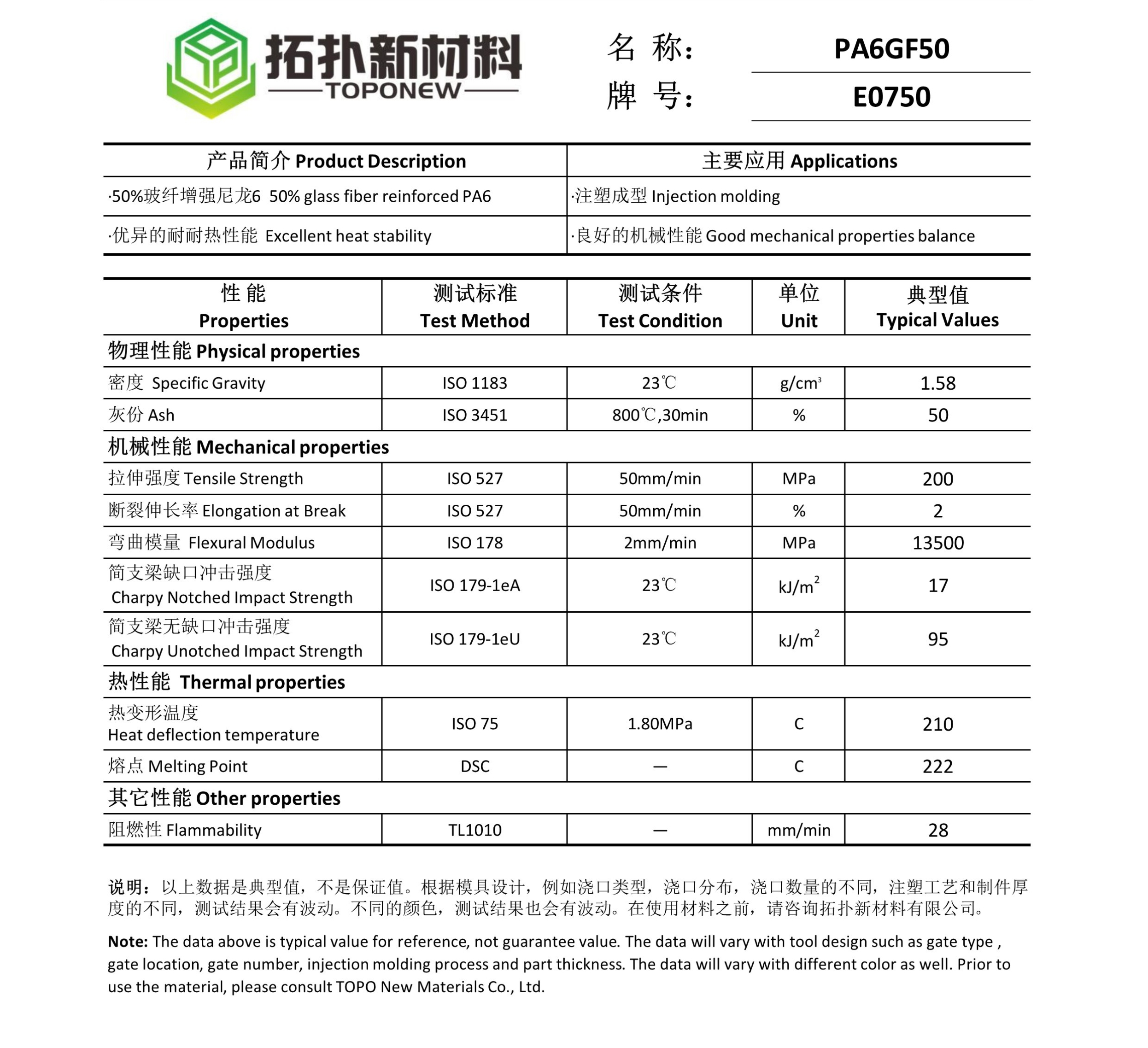
PA6 glass-filled granules are a type of engineering thermoplastic material that combines polyamide 6 (PA6) resin with glass fibers. The addition of glass fibers enhances the properties of PA6, resulting in a composite material with improved strength, rigidity, and dimensional stability.
PA6 GF15/ PA6 GF30/ PA6 GF45/ PA6 GF50
Properties of PA6 Glass-Filled Granules:
PA6 glass-filled granules offer several enhanced properties compared to unfilled PA6:
- Increased strength: The incorporation of glass fibers improves the tensile strength, flexural strength, and impact resistance of PA6, making it suitable for applications requiring high mechanical performance.
- Enhanced rigidity: Glass fibers provide stiffness and dimensional stability to the PA6 matrix, improving its resistance to deformation under load.
- Improved heat resistance: The presence of glass fibers helps to increase the heat deflection temperature of PA6, allowing it to withstand higher temperatures without deformation.
- Reduced shrinkage: Glass fibers assist in reducing the shrinkage and warpage of the material during cooling, enhancing the dimensional accuracy of molded parts.
- Lowered coefficient of thermal expansion: The addition of glass fibers reduces the coefficient of thermal expansion, making PA6 glass-filled granules less prone to size variation with temperature changes.
Applications of PA6 Glass-Filled Granules:
Due to their enhanced properties, PA6 glass-filled granules are commonly used in various demanding applications, including:
- Automotive Industry: PA6 glass-filled granules are employed in the manufacturing of automotive components such as engine covers, intake manifolds, gears, and structural parts where high strength and heat resistance are required.
- Electrical and Electronics: They find application in electrical connectors, housings, and switches, where their enhanced strength and dimensional stability are crucial.
- Industrial Equipment: PA6 glass-filled granules are utilized in the production of machinery components, bearings, and gears that require high strength and wear resistance.
- Sporting Goods: They are used in the manufacturing of sports equipment such as racquets, protective gear, and parts of bicycles and motorcycles, benefiting from their improved strength and rigidity.
In summary, PA6 glass-filled granules combine the properties of polyamide 6 with glass fibers to create a composite material with enhanced strength, rigidity, and heat resistance. Their applications span various industries, including automotive, electrical, electronics, industrial, and sporting goods, where superior mechanical performance and dimensional stability are required.
Q&A
1.What does 6 6 indicate in nylon 6 6
Nylon 6,6 is a type of polyamide (PA) polymer that is produced by the condensation polymerization of hexamethylene diamine (HMD) and adipic acid. The "6" in nylon 6,6 refers to the monomer unit, which is hexamethylene diamine (HMD), and the "6" refers to the dicarboxylic acid unit, which is adipic acid. The condensation polymerization of these two monomers produces a polymer with repeating units of -NH(CH2)6NHCO(CH2)4CO-. Nylon 6,6 has a number of beneficial properties, including high tensile strength, stiffness, abrasion resistance, and good fatigue resistance. It is widely used in various applications, such as fibers, filaments, molded parts, and engineering plastics.
2.Nylon 6 and nylon 6 6 differences
Nylon 6 and Nylon 66 are both polyamides, but they have significant differences in their chemical structure and properties. The primary difference between the two is the way they are synthesized.
Nylon 6 is produced by the ring-opening polymerization of caprolactam, while Nylon 66 is produced by the condensation polymerization of adipic acid and hexamethylene diamine. This difference in synthesis leads to variations in chemical structure and ultimately, in properties.
Nylon 6 has a softer texture, lower melting point, and greater moisture absorption compared to Nylon 66. It is also more flexible and has a lower glass transition temperature. On the other hand, Nylon 66 has higher tensile strength, stiffness, and heat resistance. It also has better chemical resistance and is less prone to hydrolysis.
In terms of applications, Nylon 6 is commonly used in areas where elasticity and flexibility are important, such as in fibers and filaments. In contrast, Nylon 66 is more suitable for applications that require higher tensile strength and heat resistance, such as in engineering plastics and molded parts.
In summary, Nylon 6 and Nylon 66 are both polyamides but have distinct differences in their chemical structure, properties, and applications.
3.What is PA GF50 material?
PA GF50 material refers to a type of material made from PA (Polyamide) resin reinforced with 50% glass fiber (GF).
Polyamide, commonly known as Nylon, is a versatile thermoplastic material known for its excellent mechanical properties, such as high strength, toughness, and resistance to wear and abrasion. When glass fibers are added to polyamide resin, it enhances the material's mechanical properties even further.
In the case of PA GF50, the addition of 50% glass fiber reinforcement makes the material significantly stronger, stiffer, and more rigid compared to unreinforced polyamide. The glass fibers also improve the material's dimensional stability, heat resistance, and fatigue resistance.
PA GF50 material is often used in applications that require high strength and stiffness combined with good impact resistance. It is commonly found in automotive components, machinery parts, industrial equipment, and structural components where mechanical performance under demanding conditions is crucial.
4. What is PA6 GF60 material?
PA6 GF60 material refers to a type of material made from PA6 (Polyamide 6) resin reinforced with 60% glass fiber (GF).
Polyamide 6, also known as Nylon 6, is a widely used engineering thermoplastic known for its high strength, toughness, and good resistance to abrasion and chemicals. When combined with glass fiber reinforcement, the material's mechanical properties are significantly enhanced.
In PA6 GF60, the 60% glass fiber reinforcement makes the material even stronger, stiffer, and more rigid compared to unreinforced PA6. The addition of glass fibers also improves the material's dimensional stability, heat resistance, and impact resistance.
PA6 GF60 material is commonly used in applications where high mechanical strength and stiffness are required, along with good impact resistance. It is often utilized in automotive parts, electrical and electronic components, industrial machinery, and structural applications where durability and reliability are essential.
Download
-
PA6GF50.pdf
Download PA6GF50.pdf


